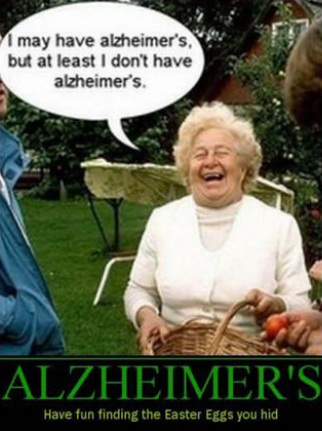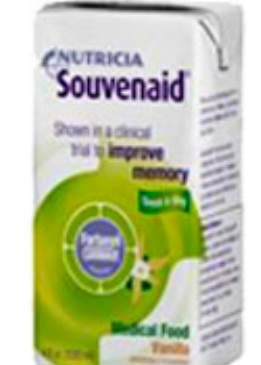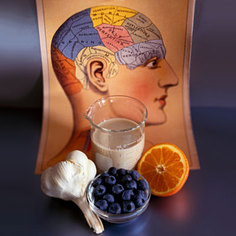How to ( maybe ) prevent Alzheimer's

Can Alheimer's Be Prevented ?
1) Maybe !
2) I can't quite remember !
In July 2011, a study presented at the Alzheimer’s Association International Conference in Paris suggested there might be some measures worth taking to give hope to the millions at risk.
1) Exercising: both your body and your mind
2) Nutrition. Eat right. Although there is absolutely no proof that this makes any difference, it is a good idea, and 'what could it hurt' ?
3) Have a smart spouse.
4) Be smart yourself. The more intelligent and educated you are the less the risk.
5) Banish Depression. It seems bad for your brain in both the short and long term. Exercise can help with this, as can counselling and even medication. Not necessarily in that order.
6) Smoking. Bad for your blood vessels, including those in the brain. Although nicotine itself seems to enhance brain function. So chewing the gum might make you old and wise.
7) Hypertension, obesity, and diabetes - all bad for the brain, and they often cluster together which is why there are under one heading. Fixing any of them helps the others.
8) Support systems. Have good friends and family, and even pets. It both keeps you smarter, and makes being dopier easy to live with
9) Gingo biloba probably doesn't work much. Neither do the anti - alzheimer's medications ( although they may keep you at a more functional level of dementia for a longer time, which is a very good thing. ) Neither does Vit E ( except perhaps in almost toxic doses ).
10) The gene ApoE4 significantly increases Alzheimer's ( but there is nothing you can do about that )
11) Getting cancer prevents Alzheimer's. Unless it is skin cancer. Most skin cancers don't prevent Alzheimer's. But other types of cancer do !
See my web page on this for further weird details. Because it is strange but true - cancer prevents Alzheimers.
12) Menopause therapy with estrogen and progesterone increases Alzheimer's
1) Maybe !
2) I can't quite remember !
In July 2011, a study presented at the Alzheimer’s Association International Conference in Paris suggested there might be some measures worth taking to give hope to the millions at risk.
1) Exercising: both your body and your mind
2) Nutrition. Eat right. Although there is absolutely no proof that this makes any difference, it is a good idea, and 'what could it hurt' ?
3) Have a smart spouse.
4) Be smart yourself. The more intelligent and educated you are the less the risk.
5) Banish Depression. It seems bad for your brain in both the short and long term. Exercise can help with this, as can counselling and even medication. Not necessarily in that order.
6) Smoking. Bad for your blood vessels, including those in the brain. Although nicotine itself seems to enhance brain function. So chewing the gum might make you old and wise.
7) Hypertension, obesity, and diabetes - all bad for the brain, and they often cluster together which is why there are under one heading. Fixing any of them helps the others.
8) Support systems. Have good friends and family, and even pets. It both keeps you smarter, and makes being dopier easy to live with
9) Gingo biloba probably doesn't work much. Neither do the anti - alzheimer's medications ( although they may keep you at a more functional level of dementia for a longer time, which is a very good thing. ) Neither does Vit E ( except perhaps in almost toxic doses ).
10) The gene ApoE4 significantly increases Alzheimer's ( but there is nothing you can do about that )
11) Getting cancer prevents Alzheimer's. Unless it is skin cancer. Most skin cancers don't prevent Alzheimer's. But other types of cancer do !
See my web page on this for further weird details. Because it is strange but true - cancer prevents Alzheimers.
12) Menopause therapy with estrogen and progesterone increases Alzheimer's
Deodorant

13) Whether or not you use deodorant containing aluminum makes no difference. And you probably should err on the side of not stinking !
14) Don't believe everything you read. All of the above is the opinion of the majority of experts in the field. But there are other experts who think they are wrong.
So lead a healthy lifestyle because it is a good idea, and it may, just may, help keep your brain in top condition for a longer time. And if your spouse thinks they are smarter than you, count it as a blessing !
(Note that alcohol isn't mentioned in the above. Too much is definitely bad, but a little nip now and then may actually be good. Some studies suggest that moderate alcohol can decrease dementia by 27 %.
So be sensible, and exercise moderation. Cheers !)
14) Don't believe everything you read. All of the above is the opinion of the majority of experts in the field. But there are other experts who think they are wrong.
So lead a healthy lifestyle because it is a good idea, and it may, just may, help keep your brain in top condition for a longer time. And if your spouse thinks they are smarter than you, count it as a blessing !
(Note that alcohol isn't mentioned in the above. Too much is definitely bad, but a little nip now and then may actually be good. Some studies suggest that moderate alcohol can decrease dementia by 27 %.
So be sensible, and exercise moderation. Cheers !)
Medical Milkshake Helps Alzheimers

July 23, 2012 (Vancouver, British Columbia)
Administration of a medical food designed to improve synaptic dysfunction is associated with continuous memory improvement in patients with mild Alzheimer's disease (AD), new research shows.
Presented here at the Alzheimer's Association International Conference (AAIC) 2012, results from an open-label extension (OLE) trial of a medical nutrition product (Souvenaid, Nutricia/Danone) showed that memory performance continued to improve in drug-naïve patients with mild AD for up to 48 weeks.
These latest OLE results immediately follow those of the double-blind, randomized controlled Souvenir II study, published in the July issue of the Journal of Alzheimer's Disease, which showed significant improvement in memory performance compared with placebo over 24 weeks. The results were "exactly what we had hoped for" according to the neuroscientists doing the research.
And their was no "ceiling effect", which means the more you eat the food the better your (mild ) Alzheimer's gets.
Developed by researchers at the Massachusetts Institute of Technology, in Boston, Souvenaid is a medical nutrition test product designed to support synapse formation.
Synapse loss, he said, is an early event in the AD process. By providing the nutritional precursors and cofactors for synapse formation, researchers hope to support the formation and function of synapses.
Administration of a medical food designed to improve synaptic dysfunction is associated with continuous memory improvement in patients with mild Alzheimer's disease (AD), new research shows.
Presented here at the Alzheimer's Association International Conference (AAIC) 2012, results from an open-label extension (OLE) trial of a medical nutrition product (Souvenaid, Nutricia/Danone) showed that memory performance continued to improve in drug-naïve patients with mild AD for up to 48 weeks.
These latest OLE results immediately follow those of the double-blind, randomized controlled Souvenir II study, published in the July issue of the Journal of Alzheimer's Disease, which showed significant improvement in memory performance compared with placebo over 24 weeks. The results were "exactly what we had hoped for" according to the neuroscientists doing the research.
And their was no "ceiling effect", which means the more you eat the food the better your (mild ) Alzheimer's gets.
Developed by researchers at the Massachusetts Institute of Technology, in Boston, Souvenaid is a medical nutrition test product designed to support synapse formation.
Synapse loss, he said, is an early event in the AD process. By providing the nutritional precursors and cofactors for synapse formation, researchers hope to support the formation and function of synapses.
The food that helps memory loss

Dr. Richard Wurtman, professor emeritus at M.I.T. and Harvard, led the research team which developed the M.I.T.-patented nutrient drink, Souvenaid.
The prescription only yogurt like drink combines various nutrients, including those found in herring and in mother's milk. Results were presented at the Alzheimer’s Association International Conference in Vancouver in July , 2012.
The prescription only yogurt like drink combines various nutrients, including those found in herring and in mother's milk. Results were presented at the Alzheimer’s Association International Conference in Vancouver in July , 2012.
And the secret ingredient is ....

The once-a-day drink contains a patented nutrient combination with the following ingredients:
However, he added, because there were virtually no side effects associated with Souvenaid, the medical food had a more favorable risk/benefit ratio compared to cholinesterase inhibitors.
People take 125 ml of the milkshake per day. Unfortunately the product is not yet commercially available, as it is still in clinical trials. But most of the ingredients can be found at your local pharmacy. Just take the above list of raw ingredients, and either load your pills up in an egg carton or throw them in a blender with some organic carrot juice, and bon appetit
Alzheimer's Association International Conference (AAIC) 2012.
Therapeutics/Therapeutic Strategies. Presented July 18, 2012 in Vancouver, Canada
BUT ....
However, further study showed that this entertaining cocktail doesn't seem to work. I have had people trying this cocktail for a few years. I haven't noticed people getting any smarter. And now a study in LANCET has also shown that people where getting any smarter. I figure it doesn't do any harm, and if it doesn't cost too much might still be worth a try, but .....
- Eicospentaenoic acid, 300 mg ( fish oil)
- Docosahexaenoic acid, 1200 mg ( more fish oil )
- Phospholipids 106 mg
- Choline, 400 mg
- Uridine monophosphate, 625 mg (RNA pills)
- Vitamin E (alpha-tocopherol equivalents), 40 mg
- Selenium, 60 µg
- Vitamin B12, 3 µg
- Vitamin B6, 1 µg
- Folic acid, 400 µg
However, he added, because there were virtually no side effects associated with Souvenaid, the medical food had a more favorable risk/benefit ratio compared to cholinesterase inhibitors.
People take 125 ml of the milkshake per day. Unfortunately the product is not yet commercially available, as it is still in clinical trials. But most of the ingredients can be found at your local pharmacy. Just take the above list of raw ingredients, and either load your pills up in an egg carton or throw them in a blender with some organic carrot juice, and bon appetit
Alzheimer's Association International Conference (AAIC) 2012.
Therapeutics/Therapeutic Strategies. Presented July 18, 2012 in Vancouver, Canada
BUT ....
However, further study showed that this entertaining cocktail doesn't seem to work. I have had people trying this cocktail for a few years. I haven't noticed people getting any smarter. And now a study in LANCET has also shown that people where getting any smarter. I figure it doesn't do any harm, and if it doesn't cost too much might still be worth a try, but .....
Run from Alzheimer's

An 80 year old runner from Victoria B.C.
Every 68 seconds someone is diagnosed with Alzheimer disease. Results of several studies in the April 24 issue of Neurology shed light on how one might make lifestyle changes to help beat the odds.
One study showed why it's important to stay active and exercise. It included more than 700 dementia-free patients enrolled in the Memory and Aging Project at Rush University Medical Center. The volunteers self-reported physical and social activity. There was also a monitor and actograph on their wrists that tracked their activity for about 10 days.
They were followed for 3.5 years; 71 of them developed Alzheimer disease. The results suggested that activity and exercise matter. The slow movers, those in the bottom 10% of activity level, were more than twice as likely to develop Alzheimer disease as the top 10% of exercisers, the ones that moved the most.
Cooking, cleaning, and gardening also counted and seemed to help. The average age of the patients in this study was 82 years, so you're never too old and it seems it's never too late to start. More physical activity can equal slower cognitive decline. So move your old bones out onto the jogging trail, or even into the garden !
One study showed why it's important to stay active and exercise. It included more than 700 dementia-free patients enrolled in the Memory and Aging Project at Rush University Medical Center. The volunteers self-reported physical and social activity. There was also a monitor and actograph on their wrists that tracked their activity for about 10 days.
They were followed for 3.5 years; 71 of them developed Alzheimer disease. The results suggested that activity and exercise matter. The slow movers, those in the bottom 10% of activity level, were more than twice as likely to develop Alzheimer disease as the top 10% of exercisers, the ones that moved the most.
Cooking, cleaning, and gardening also counted and seemed to help. The average age of the patients in this study was 82 years, so you're never too old and it seems it's never too late to start. More physical activity can equal slower cognitive decline. So move your old bones out onto the jogging trail, or even into the garden !
Hi Carbs makes you demented !

A diet high in carbohydrates and sugar may raise the risk for mild cognitive impairment (MCI) in the elderly, whereas a diet high in fat and protein may reduce this risk, new research shows.
An "optimal balance" in the proportions of daily calories derived from carbohydrates, fat, and protein may help "maintain neuronal integrity and optimal cognitive function in the elderly," the investigators, with first author Rosebud O. Roberts, MD, ChB, an epidemiologist at Mayo Clinic in Rochester, Minnesota, write.
"We think it's important that dietary intake of fats, carbohydrate, and protein is balanced because each of these macronutrients has a specific role in the body," said Dr. Roberts in a Mayo Clinic podcast.
"A high-carbohydrate intake could be bad, because they affect how glucose and insulin function in [the] brain. If there is dysfunction in glucose and insulin metabolism, it affects [the] brain," she added.
"Some people have described mild cognitive impairment as having diabetes in the brain because the sugar affects your brain in a way that is not good if you have too much of it, so with carbohydrate, we think that's what could be happening," Dr. Roberts said.
The study is published online in the Journal of Alzheimer's Disease.
Uncharted Territory
The role of dietary macronutrients, including carbohydrates, fat, and protein, on brain function in older adults is a fairly understudied area, the investigators note.
They investigated the association between percent daily energy intake from macronutrients and incident MCI in a population-based prospective cohort of 937 initially cognitively normal adults aged 70 to 89 years.
During a median follow-up period of 3.7 years, 200 developed incident MCI or dementia.
According to the researchers, in a fully adjusted model, the risk for MCI or dementia was higher in participants in quartile 4 vs quartile 1 of carbohydrate intake at baseline (> 58% vs < 47% total energy). The hazard ratio (HR) for quartile 4 vs 1 was 1.89 (95% confidence interval [CI], 1.17 - 3.06; P for trend = .004).
Similarly, in participants with the quartile 4 vs quartile 1 for sugar intake (>27 vs <19% total), the HR for MCI was 1.51 (95% CI, 0.94 - 2.41; P for trend = .05).
The risk for MCI was reduced in participants with the highest total fat intake (> 35%) compared with the lowest (< 27%). The HR was 0.56 (95% CI, 0.34 - 0.91; P for trend = .03). It was also reduced in persons with the highest vs lowest total protein intake (> 20% vs < 16%), the HR coming in at 0.79 (95% CI, 0.52 - 1.20; P for trend = .03).
In a multivariable model that included carbohydrate, fat, and protein in the same model, carbohydrate remained significantly associated with MCI or dementia (highest vs lowest intake: HR, 3.68; 95% CI, 1.61 - 8.38; P for trend = .01). In this model, fat and protein no longer showed a significant trend.
There were no significant interactions of percent carbohydrate, fat, or protein in the diet with age, sex, apolipoprotein E (APOE) ε4 allele, or body mass index.
The researchers also found trends toward reduced MCI with higher monounsaturated fatty acid (MUFA) and polyunsaturated fatty acid (PUFA) intake. "High intake of fish, an important source of omega 3 PUFA, has been associated with a reduced risk of cognitive impairment in elderly persons," they note.
Mounting Evidence
In several studies, dietary patterns have been associated with late-life cognitive function. High intake of fruits, vegetables, a Mediterranean-style diet, and several micronutrients, including vitamins B, C, E, have been found to have beneficial effects. Some prior studies have linked a high caloric intake with increased risk for cognitive impairment and caloric restriction with reduced cerebral beta-amyloid burden.
As reported recently by Medscape Medical News, in the Washington Heights/Hamilton Heights Columbia Aging Project (WHICAP), increased consumption of omega-3 PUFA correlated significantly with lower plasma levels of beta-amyloid 42 in elderly individuals without dementia.
Other data from the WHICAP study showed a lower risk for incident Alzheimer's disease (AD), MCI, and progression from MCI to AD in older adults who adhered more to a Mediterranean-style diet, characterized by a high intake of omega-3-rich fish.
Dr. Roberts and colleagues note that their findings provide some of the first data on the influence of macronutrients in the diet and suggest that dietary patterns consisting of a high intake of energy derived from carbohydrates and a relatively low intake from fat and protein "may have adverse implications for development of MCI."
The study was supported by the National Institutes of Health and by the Robert H. and Clarice Smith and Abigail van Buren Alzheimer's Disease Research Program and was made possible by the Rochester Epidemiology Project, with funds from the National Institute on Aging. The authors have disclosed no relevant financial relationships.
J Alzheimers Dis. Published online October 2012. Abstract
An "optimal balance" in the proportions of daily calories derived from carbohydrates, fat, and protein may help "maintain neuronal integrity and optimal cognitive function in the elderly," the investigators, with first author Rosebud O. Roberts, MD, ChB, an epidemiologist at Mayo Clinic in Rochester, Minnesota, write.
"We think it's important that dietary intake of fats, carbohydrate, and protein is balanced because each of these macronutrients has a specific role in the body," said Dr. Roberts in a Mayo Clinic podcast.
"A high-carbohydrate intake could be bad, because they affect how glucose and insulin function in [the] brain. If there is dysfunction in glucose and insulin metabolism, it affects [the] brain," she added.
"Some people have described mild cognitive impairment as having diabetes in the brain because the sugar affects your brain in a way that is not good if you have too much of it, so with carbohydrate, we think that's what could be happening," Dr. Roberts said.
The study is published online in the Journal of Alzheimer's Disease.
Uncharted Territory
The role of dietary macronutrients, including carbohydrates, fat, and protein, on brain function in older adults is a fairly understudied area, the investigators note.
They investigated the association between percent daily energy intake from macronutrients and incident MCI in a population-based prospective cohort of 937 initially cognitively normal adults aged 70 to 89 years.
During a median follow-up period of 3.7 years, 200 developed incident MCI or dementia.
According to the researchers, in a fully adjusted model, the risk for MCI or dementia was higher in participants in quartile 4 vs quartile 1 of carbohydrate intake at baseline (> 58% vs < 47% total energy). The hazard ratio (HR) for quartile 4 vs 1 was 1.89 (95% confidence interval [CI], 1.17 - 3.06; P for trend = .004).
Similarly, in participants with the quartile 4 vs quartile 1 for sugar intake (>27 vs <19% total), the HR for MCI was 1.51 (95% CI, 0.94 - 2.41; P for trend = .05).
The risk for MCI was reduced in participants with the highest total fat intake (> 35%) compared with the lowest (< 27%). The HR was 0.56 (95% CI, 0.34 - 0.91; P for trend = .03). It was also reduced in persons with the highest vs lowest total protein intake (> 20% vs < 16%), the HR coming in at 0.79 (95% CI, 0.52 - 1.20; P for trend = .03).
In a multivariable model that included carbohydrate, fat, and protein in the same model, carbohydrate remained significantly associated with MCI or dementia (highest vs lowest intake: HR, 3.68; 95% CI, 1.61 - 8.38; P for trend = .01). In this model, fat and protein no longer showed a significant trend.
There were no significant interactions of percent carbohydrate, fat, or protein in the diet with age, sex, apolipoprotein E (APOE) ε4 allele, or body mass index.
The researchers also found trends toward reduced MCI with higher monounsaturated fatty acid (MUFA) and polyunsaturated fatty acid (PUFA) intake. "High intake of fish, an important source of omega 3 PUFA, has been associated with a reduced risk of cognitive impairment in elderly persons," they note.
Mounting Evidence
In several studies, dietary patterns have been associated with late-life cognitive function. High intake of fruits, vegetables, a Mediterranean-style diet, and several micronutrients, including vitamins B, C, E, have been found to have beneficial effects. Some prior studies have linked a high caloric intake with increased risk for cognitive impairment and caloric restriction with reduced cerebral beta-amyloid burden.
As reported recently by Medscape Medical News, in the Washington Heights/Hamilton Heights Columbia Aging Project (WHICAP), increased consumption of omega-3 PUFA correlated significantly with lower plasma levels of beta-amyloid 42 in elderly individuals without dementia.
Other data from the WHICAP study showed a lower risk for incident Alzheimer's disease (AD), MCI, and progression from MCI to AD in older adults who adhered more to a Mediterranean-style diet, characterized by a high intake of omega-3-rich fish.
Dr. Roberts and colleagues note that their findings provide some of the first data on the influence of macronutrients in the diet and suggest that dietary patterns consisting of a high intake of energy derived from carbohydrates and a relatively low intake from fat and protein "may have adverse implications for development of MCI."
The study was supported by the National Institutes of Health and by the Robert H. and Clarice Smith and Abigail van Buren Alzheimer's Disease Research Program and was made possible by the Rochester Epidemiology Project, with funds from the National Institute on Aging. The authors have disclosed no relevant financial relationships.
J Alzheimers Dis. Published online October 2012. Abstract